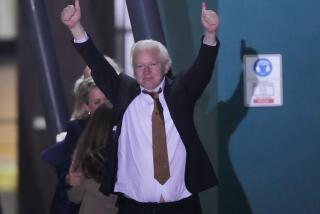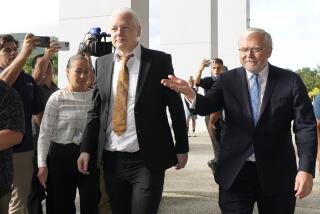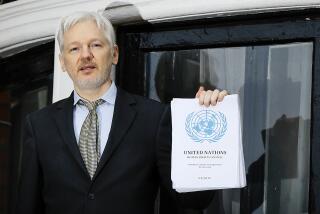Assange says government is ‘spying’ on his talks with lawyers
- Share via
LONDON — In an unusual outburst on the third day of his extradition court hearing, WikiLeaks founder Julian Assange suddenly rose from his seat and complained to the judge that he has as much involvement in his own case as a spectator at the Wimbledon tennis tournament.
Assange expressed frustration at the legal proceedings taking place inside Woolwich Crown Court in London and paranoia that his conversations were being listened to.
“I can’t speak to my lawyers with any confidentiality,” he said, alleging there were U.S. Embassy staff in the courtroom and pointing out the microphones hanging from the ceiling above him and the two prison officers sitting on either side. “This case already has enough spying on my lawyers as it is.”
Assange is facing 18 charges that he conspired with Army intelligence analyst Chelsea Manning to release classified documents to the world. Judge Vanessa Baraitser is being asked to decide whether that extradition is legal under the terms of a U.K.-U.S. treaty.
Assange was looking visibly tired in the dock during the afternoon’s proceedings, repeatedly closing his eyes, and Baraitser stopped the hearing to ask if he needed help.
“I have enough difficulty concentrating,” he said, addressing the judge directly instead of speaking through a legal representative. “I have very little contact with my lawyers — the other party must have something like 100 times more contact hours per day than I do.”
The judge said she merely wanted to know if he was able to follow proceedings.
“There is no point on my concentrating on anything since I’m not able to participate,” he replied.
“Generally speaking, defendants don’t have a voice unless and until they choose to give evidence,” Baraitser said, cutting him short.“It is completely unusual to let defendants speak for themselves especially while they’re so well and ably represented by their lawyers as you are.”
The hearing was adjourned so Assange’s legal team could meet with him in custody.
When they returned, Assange’s lawyer Edward Fitzgerald explained his client was finding it unfair that he could not “communicate with us about the issues that are arising, as they arise.”
Earlier in the day, Fitzgerald had also told the court that Assange was on medication and may need frequent breaks.
Assange sits in the dock at the back of the courtroom, behind thick glass. His lawyers said they would make an application Thursday morning for him to sit up beside them for the remainder of the hearing.
The judge said she was happy to hear such a submission, but it was unclear how adequate security provisions would be put in place or what legal process would need to be followed.
“This is a gentle man of an intellectual nature. There is no reason why he shouldn’t sit with us and be able to communicate should he need to during the hearing,” Fitzgerald said.
Earlier in the day, Assange’s lawyers argued that he is being accused of a pure political crime, and that should keep him from being extradited to the U.S. to face trial. Fitzgerald said the U.S. government’s legal team was trying to create a double standard whereby the U.S. unequivocally fights the extradition of its own citizens on political grounds, but believes it is justified in asking Britain to extradite an Australian citizen for exactly that reason.
“It’s not a one-way street,” Fitzgerald said during a morning of legal arguments. He likened the 48-year-old’s plight to other high-profile extradition cases including that of British intelligence specialist Katharine Gun, an Iraq war whistleblower, whose story was portrayed in the movie “Official Secrets” starting Keira Knightley.
Assange’s case is about “the crime of espionage directed against the national interest of the United States and therefore a classic case of a political crime,” Fitzgerald said.
Lawyers for the U.S. government say he helped Manning hack into government computers and recklessly released unredacted classified documents and diplomatic cables which put the lives of sources at risk. Assange’s defense team says he is an investigative journalist who exposed war crimes.
The judge said that the court relies on U.K. law and Britain’s Parliament removed the defense of political offense from the Extradition Act in 2003. Assange’s lawyer argued that a 2007 version of the treaty still upholds the right not to be extradited for a political offense and should be applicable.
“I’m not pretending this is an easy issue,” Fitzgerald told Baraitser. “But it’s a fundamental issue.”
“If it’s not a terrorist case, not a violent case, then the principle you should not be extradited for a political offense is of virtually universal application,” he added. “It dates back for more than 100 years.”
Lawyer James Lewis, representing the U.S. government, disputed that analysis, saying that provision could not be applied in this context.
Assange is being held in Belmarsh prison after being arrested by British police in April on a bail violation. He had been living in London’s Ecuadorian Embassy for seven years after being granted political asylum by the country’s government. He was fighting extradition to Sweden, where he was wanted for questioning over sexual assault claims that were later dropped.
An additional three-week hearing is scheduled for May when witnesses will be called.
Boyle is a special correspondent.
More to Read
Sign up for Essential California
The most important California stories and recommendations in your inbox every morning.
You may occasionally receive promotional content from the Los Angeles Times.










